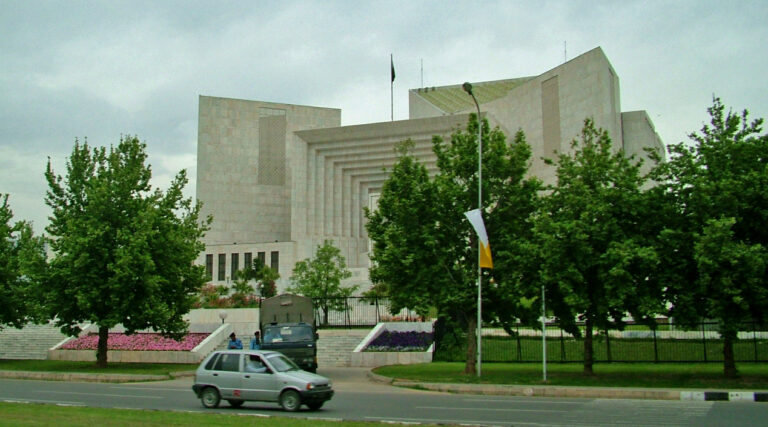
Reflecting on State Cooperation with Religion in Europe
Silvia Meseguer Velasco
Image of European Court of Human Rights in Strasbourg, France on Wikimedia by CherryX (CC BY-SA 3.0).
The following essay reflects on the monograph, Cooperación del Estado con la religión en Europa, written in Spanish by Silva Meseguer Velasco. The work is part of the Roots of Law collection of the Aranzadi publishing house, directed by John Witte Jr., professor at Emory University School of Law in Atlanta, and by Rafael Domingo Oslé, professor and holder of the Álvaro d’Ors Chair at the Culture and Society Institute of the University of Navarra. This work — which forms part of the activities of the research group Religión, Derecho y Sociedad (REDESOC) of the Complutense University of Madrid — has been developed within the framework of the Research Project of the Spanish Ministry of Science and Innovation “Neutralidad religiosa del Estado y cooperación con la religión y creencias en Europa” (NEUCOPER), under the effective direction of its principal investigator, Javier Martínez-Torrón, professor at the Complutense University of Madrid and President of the International Consortium for Law and Religion Studies (ICLARS).
I wrote State Cooperation with Religion in Europe to study the various models of relations between the State and the churches that exist in Europe. Starting from the premise that the purpose of cooperation with religion must be to guarantee and make effective the exercise of freedom of religion and belief under conditions of equality, I examine the main institutional channels of State cooperation and the legal instruments that European States use to conduct their dialogue with religious communities. I focus, in particular, on the question of whether relations between the State and religion should be regulated by ordinary law or by special law. The piece also spends time on the current legal and political relevance of agreements in the twenty-first century in contemporary Europe, especially in the light of growing religious pluralism and the process of secularization that characterizes society in many European countries.
The book starts with the fact that there is a pluriform panorama of models of the relationship between the European States and the Christian religion derived from their historical precedents and cultural traditions. In all of these models, one can appreciate the traces of the Christian religious heritage, and also of the strong secularization process that has considerably limited the presence of religion in law and politics in Europe, much more so than in other countries of the world. The balance between these two factors is well known. Different cultures and sociological climates, along with the constitutional context in each State, justify the existence of different legal systems. These systems are all valid and legitimate, and they will manifest in different forms and levels of State-Church relationships.
Neither the European Convention on Human Rights nor the primary law of the European Union demand a specific model of State-Church relationship. Rather, European legislations are required to provide certain legal rules — also political — that guarantee the coexistence between individuals with different beliefs and between religious groups and other non-religious organizations in the same public space. These laws are, above all, the consequence of a political decision made by the States, which have a wide margin of discretion or appreciation. This margin of discretion refers to the ability of States to choose among various forms of cooperation with religious groups and non-confessional organizations, while still protecting religious freedom and equality. However, there are instances where this discretion is not absolute. Thus, if the State must cooperate with the institutionalized religious fact insofar as it implies giving effectiveness to the exercise of a fundamental right, the State’s margin of appreciation will necessarily be restricted when the choice of the various forms of cooperation has adverse consequences for the protection of the freedom of religion and belief of religious groups and similar entities.
This criterion, which forms the basis of the latest rulings of the Strasbourg Court, represents a shift in the traditional approach to cooperation, which has historically been divided into distinct categories based on the relationship between the State and religion. The boundaries between confessional, separatist, and cooperative systems are becoming increasingly blurred. The European Union is moving in this direction when it declares its intention to remain aloof from the different models of relationship established in internal legislations. But, at the same time, it affirms its interest in maintaining an institutionalized dialogue on an equal footing with churches or confessional organizations and also with non-religious groups. The result is that cooperation —dialogue— is configured as an instrumental principle (together with neutrality and impartiality) that informs the actions of European States in the protection of a fundamental right.
However, attributing a greater role to cooperation as a principle that must inspire the actions of public authorities at the national level necessarily requires knowing how these relationships are instrumentalized and, above all, an understanding of the real consequences of cooperation on the effectiveness of the exercise of religious and ideological freedom. That is to say, it implies reviewing whether the traditional legal instruments on which this cooperation is developed — whether they are the result of the agreement of both parties, or whether they come from unilateral state norms — continue to fulfill their function in regulating the pluralism of European societies; or whether, on the contrary, they should be replaced by other proposals based on dialogue, more or less institutionalized, as a backdrop against which the collaboration between the State and non-religious confessions and groups is projected.
In recent times, the rise of dialogue as a tool for establishing relations between the State and religion has not gone unnoticed. The inclusion of this term in the primary law of the European Union has made it a point of reference for establishing relations between civil and religious authorities. Naturally, one might wonder whether this paradigm shift of cooperative relations based on institutional dialogue between public authorities and groups, without the need for formal instruments, could be the solution to the shortcomings detected in the bilateral nature of the normative sources.
The relationship between bilaterality and dialogue is not resolved in exclusive terms. They are complementary instruments used by the public authorities — at the national, regional and local levels — to give effectiveness to the exercise of a fundamental right. Consequently, the dialogue agreed upon may take the form of concordats and agreements, state legislation emanating exclusively from one party, and finally, it will be projected on different modes of dialogue, more or less informal, between civil and religious authorities, both nationally and transnationally. In short, the objective is to achieve a balance between the formal conventional path and informal dialogue between the public authorities and religious denominations on matters of common interest.
This dialogue should be strengthened in terms of independence, autonomy, and reciprocal respect. Moreover, in order to ensure the principle of equality, all religions and non-confessional organizations living side by side in civil society must be involved in this process of dialogue. Non-confessional organizations are.
In essence, this study reveals that the reinterpretation of the principle of cooperation, or the evolution of its classical approach, places the focus of attention on the positive consequences that the cooperative relations of the State project on the protection of freedom of religion and belief of individuals and religious groups under conditions of equality. It is important to note that cooperative relations with religious groups, including non-religious groups, are the general rule in Europe, not the exception. The concept of cooperation is not limited to specific models of relations that explicitly establish bilateral relations. Rather, projected in those countries that seek consensus and dialogue on common interests with different interlocutors. ♦

Silvia Meseguer Velasco is Professor of Law at the Complutense University of Madrid. She is a Corresponding Fellow of the Royal Academy of Jurisprudence and Legislation of Spain and Vice President of the Institute for the Analysis of Religious Freedom and Religious, Cultural and Ethical Identity (LIRCE).
Recommended Citation
Velasco, Silvia. M. “Reflecting on State Cooperation with Religion in Europe.” Canopy Forum, June 19, 2024. https://canopyforum.org/2024/06/19/reflecting-on-state-cooperation-with-religion-in-europe/.
Recent Posts










